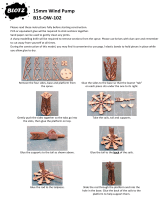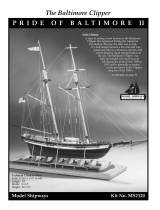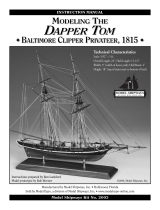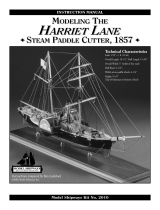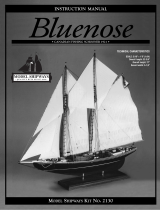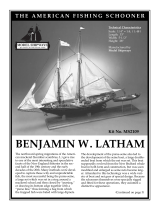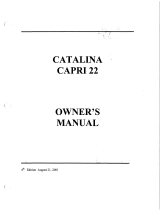Page is loading ...

641
SANTISIMA TRINIDAD: Step by Step ™
Use 0.5mm brown thread to create
the sling (172). Tie it to the sling in the
centre of the fore yard, pass it up and
through the sling below the foretop,
then back down and through the fore
yard sling. Then pass it through the
foretop sling again, and repeat until it
has been passed through the foretop
sling three times. Pull it tight to remove
any slack and tie it off to the yard sling.
Tie the fore yard jeers (173) above
the double blocks hanging from
the foretop, either side of the sling.
Thread the other end through the
corresponding double block on the
fore yard, then through the foretop
double block, and repeat. When the
thread has passed through the second
hole of the top block, tie it off to the
point indicated on the plan.
Your parts
264. Fore topsail
265. Fore topgallant sail
Tools and equipment
Ruler
Knife
Glue
Needle
A
B
Stage 161
264
265
172
49
173
173

642
SANTISIMA TRINIDAD: Step by Step ™
This photo shows how the jeers and
halyards should be tied off to the deck.
This photo shows the foremast, but the
other masts will be similar.
Follow the same process to rig all the
halyards (foremast 174-176, mainmast
178-180, mizzenmast 183-185) and
jeers (177). The slings (181, 182 and
186) will be rigged later.
Prepare one of the spritsail yard lifts
(188) and tie one end above the block
indicated on the plan. Starting at the
red dot, follow the arrows, passing the
thread through the single block at the
end of the spritsail yard, back up and
through the block tied to the bowsprit,
then aft through the eyebolt on the
yard. Tie off to the column at the bow,
as indicated in figure Q on the rigging
plan. Repeat for the second lift.
C
D
E
188
188
174

643
SANTISIMA TRINIDAD: Step by Step ™
Loop the earrings in the top corners of
the spritsail (191) over the ends of the
spritsail yard. Adjust the position of the
sail so that it is centred on the yard.
Rig the sprit topsail yard lifts in the
same way as the spritsail yard lifts. Pass
them through the second eyebolts on
the spritsail yard before tying them off.
Prepare the ropeband (190). Tie a
knot in one end and thread the other
end through a needle. Push the needle
through the head of the spritsail,
from the front, and loop the thread
over the yard and back through the
sail. Continue looping the ropeband
through the head of the sail and around
the yard until you reach the other end.
Tie a knot at the end and cut off
the excess.
F
G
H
189 189
191
191
190

644
SANTISIMA TRINIDAD: Step by Step ™
Tie the sheets off to the points indicated
in figure Q on the rigging plan.
Pass the sheets (192) through the loops
in the clews of the spritsail. Twist the
loops, as shown, and secure with glue.
The photo shows how the assembly
should look at this stage. Keep any left-
over material, as it will be used later.
I
J
K
192
192
192
191

645
SANTISIMA TRINIDAD: Step by Step ™
Tie one end of the fore yard sling (181)
to the eyebolt on the port side of the
mast cap. Pass it down and between
the lower mast and topmast, then up
and through the block and finally down
through the hole in the foretop, tying it
off at the point indicated in figure E on
the rigging plan. Repeat this process for
the main yard sling (182) and the cross
jack sling (186).
Secure the sprit topsail (193) onto the
sprit topsail yard with the ropeband
(190) in the same way as the spritsail.
Your parts
270. Mainsail
273. Main royal sail
Tools and equipment
Knife
Ruler
Glue
Needle
A
B
Stage 162
270
273
193
181
190

646
SANTISIMA TRINIDAD: Step by Step ™
Prepare the foreyard lifts (195).
Tie one end to the block at the side
of the mast and pass the other end
through the block at the end of the
yard, then through the hole in the
first block. Repeat until it has passed
through both holes of both blocks, then
tie it off to the point shown in figure Q.
Attach the sheets to the clews of the
sprit topsail. Pass them aft, through the
hole at the end of the spritsail yard,
then inwards and through the blocks
shown. Finally, tie them off at the bow.
Following the same process as in the
previous step, and figure G of the
rigging plan, prepare and rig the rest of
the lifts (196-205).
C
D
E
194
195
204
205

647
SANTISIMA TRINIDAD: Step by Step ™
Tie the fore topsail yard braces (207)
to the mainmast stay and preventer,
just above the foreyard braces. Pass
them through the blocks hanging from
the ends of the fore topsail yard, then
through the blocks shown in the inset.
Finally, tie them off to the point on the
deck indicated in figure Q.
Tie the foreyard braces (206) to the
mainmast stay (155) and preventer
(156) at the point indicated on the
plan. Pass them through the blocks
hanging on the braces at the end of the
foreyard. Then pass them back through
the block tied to the stay (inset), and
pass them down and tie them off to
the point indicated in figure Q on the
rigging plan.
Tie the fore topgallant yard braces
(208) to the main topmast preventer,
and the fore royal sail braces (209) to
the crosstrees. Pass them through the
blocks at the ends of the yards, and
then back and through the blocks on
the stay and preventer. Tie them off to
the deck, as shown in figure Q.
F
G
H
206
156
155
206
207
207
208
209
157
158

648
SANTISIMA TRINIDAD: Step by Step ™
Tie the main topsail yard braces (211)
to the mizzenmast stay (161). Pass them
up and through the blocks hanging
from the ends of the main topsail yard,
then aft through the double block on
the stay (inset), and finally tie them off
on the deck.
Tie one end of the main yard brace
(210) to the railing towards the stern of
the ship. Pass the other end forward
and through the block hanging at the
end of the main yard, then aft to the
block at the side of the ship (inset). Pass
the brace through the block and tie it
off to the railing just above it. Repeat
for the other side.
The photo shows how the assembly
should look at this stage. Keep any left-
over material, as it will be used later.
I
J
K
210
211
161
161
D
211

649
SANTISIMA TRINIDAD: Step by Step ™
Tie the main topgallant yard braces
(212) to the mizzen topmast stay (162).
Then pass them through the blocks
at the end of the main topgallant
yard, then aft through the D block
on the stay, and tie them off to the
points indicated in figure Q. Repeat
this process to rig the main royal yard
braces (213).
Drill a hole in the front of the foretop
and tie one end of the spritsail yard
brace (214) and sprit topsail yard
brace (215) through it. Pass the other
ends of the braces through the brace
blocks at the ends of the yards. Lead
the ends of the braces aft and then
through the double blocks (circled)
hanging underneath the foretop.
Your parts
271. Main topsail
272. Main topgallant sail
Tools and equipment
Knife
Ruler
Glue
Needle/awl
Pliers
A
B
Stage 163
271
272
213
213
212
D
162
212
215
215
214

650
SANTISIMA TRINIDAD: Step by Step ™
Retrieve the outer jib (219) from Stage
151. Pierce seven holes along the luff
(forward edge) at the points indicated in
figure J. Loop a 3mm ring (H) through
each of the holes. Apply a little glue to
the loops to prevent them from moving.
Prepare the cross jack braces (216),
the mizzen topsail yard braces (217)
and the mizzen topgallant yard braces
(218), and tie three C blocks to the
aft shrouds on both sides of the ship.
Tie the braces to the shrouds, just
above the C blocks, then pass them
through the blocks hanging at the end
of their corresponding yards, back
to the shrouds, through the C blocks
and down, tying them off to the points
indicated in figure Q of the rigging plan.
Pierce another hole at the head (top) of
the sail and tie a block (C) there. Open
the rings (H), hook them over the fore
topmast preventer (151), and then close
them. Tie the outer jib halyard (220) to
the block at the top of the preventer,
pass it through the block at the head
of the sail, back up and through the
preventer block, then down and tie off.
Tie the outer jib downhaul (221) just
below the head block (C). Pass it down
through the centre ring (circled), then
the block on the bowsprit, and finally
tie off to the deck. Tie the sheets (222)
to the clew of the sail and the deck.
C
D
E
216
C
218
217
219
H
220
219
221 C
220
C
219
221

651
SANTISIMA TRINIDAD: Step by Step ™
Retrieve and prepare the main staysail
(223), the main topmast staysail (228)
and the main topgallant staysail (233).
Secure them to the corresponding stays
and preventers, and rig the halyards,
downhauls, tacks and sheets, following
figure J on the rigging plan. Secure the
lines to the deck, at the points shown
in figures Q and R. Tie the gaff boom
and driver boom (arrowed) to the
mizzenmast in the same way as you tied
the yards to the other masts.
Retrieve the flying jib (243) from Stage
153 and the inner jib (247) from
Stage 154. Prepare them in the same
way as the outer jib (219), according
to figure K. Attach the sails to the fore
topgallant preventer (flying jib) and the
fore topmast stay (inner jib). Rig both
sails with their halyards (244 and 248),
downhauls (245 and 249) and sheets
(246 and 250).
Prepare the spanker sheets (238). Tie
one end of a sheet above the block on
the yard closest to the lanterns, pass
the sheet down through the block on
the deck, then through the yard block
and repeat, tying it off to the point
indicated in figure R. Repeat this for
the second block at the end of the yard.
Then follow the same process for the
two blocks in the middle of the yard,
securing the ends to the pin rail aft of
the mizzenmast.
F
G
H
248
C
247
250
C
H
243
228
233
223
238

652
SANTISIMA TRINIDAD: Step by Step ™
Prepare the mizzen staysail (251) and
the mizzen topmast staysail (255).
Follow figure K and figure Q to rig and
secure them to the mizzenmast and
mizzen topmast stays, and to the deck.
Tie one end of the spanker brace (259)
to the railing, pass it up and through
the brace blocks at the sides of the
gaff boom, then back down and tie the
other end to the rail.
Sew the spanker (239) onto the gaff
boom (131) with the ropeband (190).
Tie the two lifts (240) to the end of the
driver boom, pass the ends either side
of the sail, through the block on the
mast cap and then down. Rig the throat
halyard (241) and peak halyard (242).
Follow the directions in figure J, and tie
the lines off at the points indicated in
figure Q.
The photo shows how the assembly
should look at this stage. Keep any left-
over material, as it will be used later.
I
J
K
242
242
190
259
241
240
239
251
255

653
SANTISIMA TRINIDAD: Step by Step ™
Position the foresail (263) centrally
onto the foresail yard, and secure with
the ropeband (190).
Fit the fore topsail (264), fore topgallant
sail (265) and fore royal sail (266) to
their corresponding yards in the same
way as the foresail.
Your parts
266. Fore royal sail
277. Mizzen topsail
Tools and equipment
Needle
Knife
Ruler
Glue
A
B
Stage 164
277
266
190
263
266
265
264

654
SANTISIMA TRINIDAD: Step by Step ™
Fit the mainsail (270), main topsail
(271), main topgallant sail (272) and
the main royal sail (273) to their
corresponding yards.
Attach the sheets (267-269) to the
clews of the corresponding sails. Pass
the sheets through the holes in the
yards below (inset), then bring them in
towards the mast, through the blocks
and down, tying them off at the points
shown in figures Q and R.
Rig the sheets (274-276) to the clews
of the sails. Pass the sheets through
the holes at the end of the yards, bring
them in towards the mast, through the
blocks and then down to the deck, tying
them off at the points shown in figures
Q and R on the rigging plan.
C
D
E
273
272
271
270
276
275

655
SANTISIMA TRINIDAD: Step by Step ™
Tie the spanker brails (285) to the
leech (aft edge) of the spanker, at the
three points shown. Pass them up and
through the three blocks on each side
of the boom, then pass them down and
tie them off to the railing.
Attach the mizzen topsail (277) to the
mizzen topsail yard with the ropebands
(190). Rig the sheets (278) from the
clews of the sail to the blocks, and
down to the deck.
Attach two blocks (C) to the clews of
the foresail (263) and the mainsail
(270). Rig the foresail sheets (281), the
mainsail sheets (283) and the mainsail
tacks (284), following the lines in figure
M. To rig the foresail tacks (282), tie
each line around the block on the
boomkin, pass it through the front
block (C) on the foresail, through the
boomkin block and then tie it off to the
column at the bow.
F
G
H
190
277
285
282
C281
C

656
SANTISIMA TRINIDAD: Step by Step ™
In order to rig the foresail clewlines
and mainsail clewlines (286 and 290),
you will need to sew another block (C)
to the clews of the sails, next to the two
that are already there (inset). Rig the
lines in the same way as all the others,
following figure N, and tie off to the
point identified in figure R.
Sew a block (C) to the clews of each of
the sails of the foremast, mainmast and
mizzenmast. Rig the clewlines (287, 288,
289, 291, 292, 293 and 294), beginning
at the yard, passing the line through the
clew block, up through the yard block
and then down to the deck. Tie off to
the point indicated in figure R.
The photo shows how the assembly
should look at this stage. Keep any left-
over material, as it will be used later.
I
J
K
C
286
291 C

657
SANTISIMA TRINIDAD: Step by Step ™
Fix the mizzen topgallant sail (279) to
the mizzen topgallant yard, using the
ropeband (190). Rig the sail with the
sheets (280) and the clewlines (295),
remembering to fix a block (C) to the
clews of the sail.
Prepare the fore topsail buntlines
(297), shown in figure O. Tie one of
the buntlines around the yard, lead
it around the front of the sail, pass it
underneath, and then up the back of
the sail and through the block on the
rear of the yard. Then pass it through
the block on the crosstrees and lead it
down, tying it off to the point indicated
in figure Q. Repeat this procedure for
the remaining three buntlines of the
fore topsail.
Your parts
260. Flag
262. Pennant
279. Mizzen topgallant sail
Tools and equipment
Ruler
Knife
Glue
Needle
A
B
Stage 165
260
279
262
C
295
190
279
297

658
SANTISIMA TRINIDAD: Step by Step ™
Pierce a hole in the side of the
lower three sails of the foremast and
mainmast. Tie the leechlines (308,
309, 310, 311, 312 and 313) to these
holes. Pass the lines up and through
the blocks hanging from the back of
the yard, as shown in figure P, then
lead them down and tie them off to the
points indicated in figures Q and R.
Repeat the process described in the
previous step to rig the rest of the
buntlines to the remaining yards.
The buntlines are used to lift the
middle areas of the sails, and doing this
will make more of the deck visible.
Attach a block (C) to the clews of the
spritsail and sprit topsail. Following the
table and diagram in figure P, prepare
and rig the spritsail and sprit topsail
clewlines (304, not shown, and 305) to
the sails.
C
D
E
305
C

659
SANTISIMA TRINIDAD: Step by Step ™
This shows the bowsprit with the
buntlines pulled in. It is up to you how
you tension them.
Prepare and rig the clewlines of the
spritsail and sprit topsail (306 and 307).
Cut around the pennant (262) and
the flag (260) to remove them from
their sheets. Stick the two sides of the
pennant together, with some thread at
the end. Place the flag halyard (261) in
the centre of the flag and fold the two
sides of the flag together (inset).
F
G
H
260
262
261
307
306

660
SANTISIMA TRINIDAD: Step by Step ™
Tie one end of the pennant thread to
the top of the mainmast, and the other
end to any free pin or eyebolt at the
base of the mast. Shape the pennant
(262) in the same way as the flag.
Now you can mount your model on the
display stand received with this series.
Hold the flag as shown, and pass the
flag halyard (161) through the block at
the end of the gaff boom. Tie off both
ends to the stern railing. Wrap the flag
around something cylindrical to give it a
more realistic feel.
Your model of
the Santísima
Trinidad
is now complete!
I
J
K
260
262
161
/
